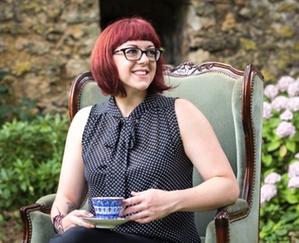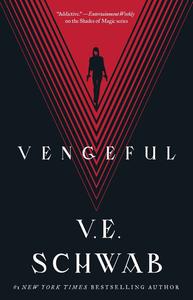
|
|
| photo: Jenna Maurice | |
Congratulations on 15 books by the age of 30! That is quite an accomplishment.
It's a bit scary! I sold my first book when I was 21. It's been 15 books in just under eight years, so I'm tired! I need a nap [laughing]. I've got seven more scheduled under contract between now and 2021. They keep me busy, but I love being busy.
In Vicious, there is a lot of credible science dealing with nature versus nurture in the discussion about extraordinary beings (extra-ordinaries, or EOs). How much research did that entail?
My goal was to make it as medically feasible as possible. You see pieces all the time about people performing incredible feats of strength in dire moments due to the adrenal response system. I did a lot of research into how to ground the supernatural ability into something medically feasible. Near-death experiences are real things. Adrenal-response distress is a real thing.
One of my favorite things about being an author is that for a very short period of time, I get to become an expert on something. I wanted it to feel authentic. I wanted the writing style to be incredibly analytical and distanced, almost medical-text level.
Does this continue in Vengeful?
To an extent. Sydney from Vicious becomes a main character, part of a new trio of main characters. It's a slightly different tactic because the three don't have medical backgrounds.
What set Victor and Eli apart was that they're the only EOs who have done this to themselves--they have a level of scientific agency that others don't possess. For everyone else, this is accidental. There is a slightly more emotional tone in Vengeful, and I worry that some people will think because it's about women, it's more emotive than analytical. And it's not that at all. It's just that they aren't scientists, and they are not approaching the dilemma in the same way.
Structurally the novels are similar. I wanted to play with alinearity and time, so I do a huge amount of cutting backwards and forwards to stitch together the narratives.
 Time is a vital element in Vicious; in fact, it is just as important as the main characters.
Time is a vital element in Vicious; in fact, it is just as important as the main characters.A lot of what makes our present interesting is our past. I love playing with assumptions and presumptions and with bias, and with the idea that you assume you know these characters because of how you know them in the present. I love undercutting those assumptions by then showing you the past. I use flashback and past to mess with a reader's assumptions about a character's personality. It's something that's going to happen a lot in Vengeful.
Part of it is that I love how it adds depth to a story, and how it can interrupt the present momentum in a way that actually builds the tension.
In Vicious, there is considerable philosophical and ethical flip-flopping between the good and bad of science. Do you see these roles more clearly defined in Vengeful?
I want to be totally flip-flopping! The whole reason I wrote Vicious was as an exercise for myself to see if I could write a story without any heroes and make the reader not root for anybody. If you take heroism out and make it arbitrary, everyone in the book is a bad person who does bad things. I found in the course of writing Vicious that it is never actually what we do, but why we do it, so motivation becomes the crux of the relatability of the characters.
In fact, in Vengeful, Eli will pose a very different question, which is the idea of responsibility. What if, in playing God (trying to make themselves EOs), Eli and Victor opened the floodgates and are being punished by God? His argument is always tethered to a religious place, whereas Victor's is in science. So I still want to continue pitting them against each other in ethos and in philosophy. They are going to be always at odds, even if they are experiencing the same things. And they are experiencing the same things through different lenses.
If you add morality to that, that being an EO strips you of that inherent morality--of your conscience, of your soul--it adds a really interesting layer. I love playing with philosophical and moral dilemmas in this series. --Nancy Powell, freelance reviewer and writer

